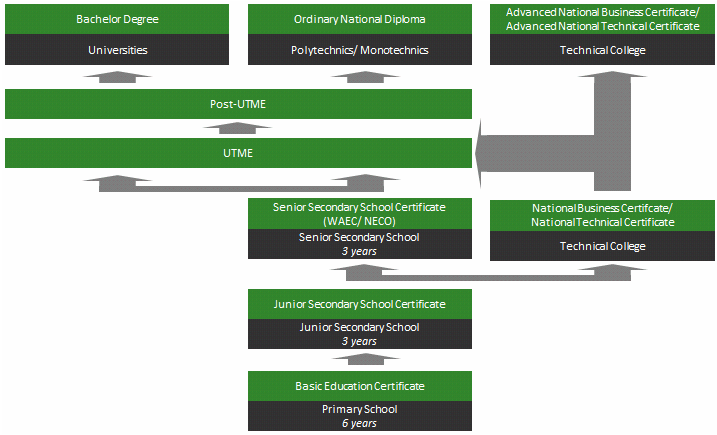The Education System
With the introduction of Universal Basic Education (UBE) a total of 9 years formal schooling is mandatory for all students. Overall, primary and secondary schooling involves three school types:
Students spend a total of six years in primary schools, after which they progress to Junior Secondary School (JSS). Students spend a total of three yearrs at Junior Secondary School and graduate with the Junior Secondary School Certificate (JSSC). The results in the JSSC regulates admission to the Senior Secondary Schools.
- Primary Schools
- Junior Secondary Schools
- Senior Secondary Schools
Students spend a total of six years in primary schools, after which they progress to Junior Secondary School (JSS). Students spend a total of three yearrs at Junior Secondary School and graduate with the Junior Secondary School Certificate (JSSC). The results in the JSSC regulates admission to the Senior Secondary Schools.
Technical and vocational education is also available for graduates of junior secondary school. A two-tier system of nationally certified programs is offered at science technical schools, leading to the award of National Technical/Business Certificates (NTC/NBC) and Advanced National Technical/Business Certificates. The lower level program lasts three years after Junior Secondary School and is considered by the Joint Admission and Matriculation Board as equivalent to the SSC.
After three years of Senior Secondary School students take the Senior Secondary School Certificate Examination (SSSCE) which are administered by the West African Examination Council (WAEC) or the National Examination Council (NECO). Completing the SSC successfully is a prerequisite for entering an institution of higher education.
In order to be accepted by a Nigerian University students have to sit the Unified Tertiary Matriculation Examination (UTME), which is administered by the Joint Admissions and Matriculation Board (JAMB). The UTME result decides whether a student is eligible to write the specific admission exams of the different Universities, which is referred to as Post-UTME.
After three years of Senior Secondary School students take the Senior Secondary School Certificate Examination (SSSCE) which are administered by the West African Examination Council (WAEC) or the National Examination Council (NECO). Completing the SSC successfully is a prerequisite for entering an institution of higher education.
In order to be accepted by a Nigerian University students have to sit the Unified Tertiary Matriculation Examination (UTME), which is administered by the Joint Admissions and Matriculation Board (JAMB). The UTME result decides whether a student is eligible to write the specific admission exams of the different Universities, which is referred to as Post-UTME.


